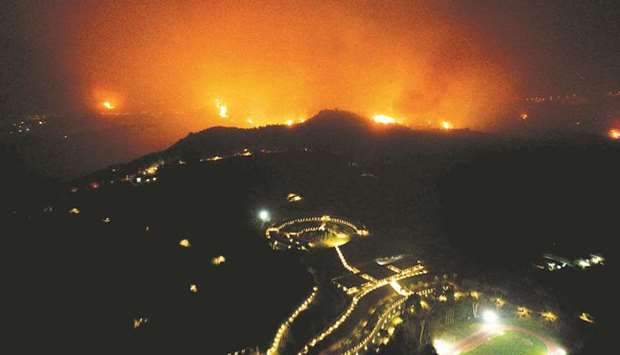Turkish coastguards evacuated hundreds of villagers away from a smouldering power plant yesterday, and Greek firefighters battled a major blaze near an ancient Olympic site as a historic heatwave wreaked havoc across Europe’s southeast.
The two regional rivals have been united this week in their fight against disasters that top officials and experts link climate change.
Eight people have died and dozens have been hospitalised across the southern coasts of Turkey since the wildfires erupted last week.
High winds rekindled wildfires north of Athens yesterday as emergency crews battled for a third day to control blazes across Greece in searing, tinder-dry conditions.
A wall of dark smoke rose high above the Greek capital, residents fled suburbs, asylum-seekers were evacuated and authorities warned of more blazes today as temperatures hovered around 40° Celsius (107 Fahrenheit).
“If there are even few people who have reservations about whether climate change is real, I call on them to come here and see,” Prime Minister Kyriakos Mitsotakis said from Ilia, where the flames had threatened Ancient Olympia.
He visited an area in the western Peloponnese near the site of the ancient Olympic Games where firefighters fought all night to save one of Greece’s best known archaeological sites.
Firefighters, backed by waterbombing fixed wing aircraft and helicopters, had managed to control some of the blazes near Athens earlier in the day.
However, the winds fanned them back into life, with flames burning close to the motorway connecting Athens to northern Greece.
Yesterday afternoon authorities ordered the evacuation of the suburbs of Afidnes, Kryoneri, Kokkinovrahos and Ippokrateios Politeia north of Athens, as well as asylum-seekers from the nearby Malakasa migrant reception centre.
The Civil Protection Authority issued an “extreme fire warning” for half the country amid the heatwave.
The finance ministry announced emergency payments of up to €6,000 ($7,100) for people who had lost possessions.
Local utilities said there could be rolling power cuts in some parts of the Attica region around the capital due to the fire.
The governor of Attica also ordered the closure of all parks and open spaces across Athens and the region.
On the island of Evia, off the coast of mainland Attica, church bells rang to warn residents of the fires.
More than a dozen villages on the island have already been evacuated.
The blazes forced also the government of North Macedonia to declare a 30-day state of emergency and the defence ministry in its Balkan neighbour Albania to declare the situation “critical” because of the threat to village homes.
The fires killed one person in Albania this week.
However, perhaps the biggest shock came when winds whipped up a flash fire that subsumed the grounds of an Aegean coast power plant in Turkey storing thousands of tonnes of coal.
An AFP team saw fleeing villagers – some clutching pets they managed to grab from their homes – piling onto coastguard speedboats at the nearby port as roaring flames lapped the 35-year-old plant in the dark of night.
A few older locals refused to leave the disaster-hit region even while thousands of others were shuttled out by car or boats racing along the Aegean Sea.
“Where do you want us to go at our age?” asked 79-year-old Hulusi Kinic. “We live here. This is our home. Our last solution was to throw ourselves in the sea (if there was an explosion), but thank God that did not happen.”
Turkish President Recep Tayyip Erdogan’s office said an initial inspection conducted after the flames had been doused by the morning showed “no serious damage to the main units in the plant”.

Firefighters use water cannon to douse a fire near the Kemerkoy Thermal Power Plant, at Oren in Milas, Turkey.

